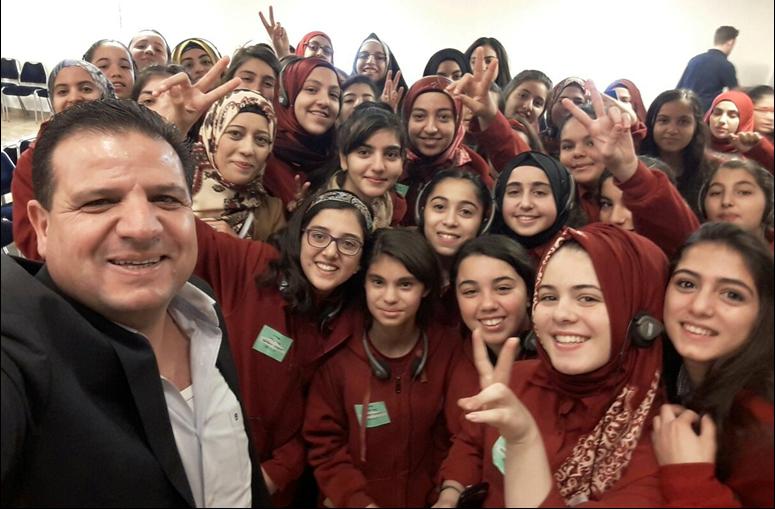There is only one possible explanation for Defense Minister Avigdor Lieberman’s insanity in the past two weeks: elections. The smell of approaching elections is driving everyone crazy, especially Lieberman, who for a long time tried to project an image of a responsible adult. His unbridled attacks on the Arab public and its elected officials put an end to that.

MK Ayman Odeh with students from Umm el-Fahem, on Monday, December 18, during a visit by the young women to the Knesset in Jerusalem (Photo: Al Ittihad)
Perhaps the latest attack should be seen as a sign of moderation, or a portent of worse to come? After all, before the last election Lieberman called for the beheading of Israeli Arabs — influenced, presumably, by the Islamic State atmosphere, the general tenor of Prime Minister Benjamin Netanyahu’s far-right government and a public mood conducive to such ideas.
Transfer and expulsion have been incorporated into the platform of Lieberman’s languishing party. But anyone with eyes in his head knows that expelling the residents of Wadi Ara and transferring its communities to the territory of the future Palestinian state is a fantasy, to put it mildly. Not only because we Arab citizens object and because it involves forcibly revoking the citizenship of hundreds of thousands of people, but also because it is unfeasible. Israel would never agree to its border being near Hadera, and for travel to Afula require a detour through Palestine. So why does Lieberman keep returning to that plan?
The expulsion plan, like his op-ed in Haaretz Wednesday, is part of a broad strategy to spark violence between Jews and Arabs by dehumanizing and delegitimizing Israel’s Arab citizens by portraying them as frightening, dangerous and even murderous.
To Lieberman, Israeli identity is built by stripping Arabs of their citizenship. Arabs thus live on borrowed time in Israel, their existence here not something to be taken for granted. The goal is to deny the Arab public its political legitimacy, to cast doubt on its citizenship. After all, how am I, an Arab in Haifa, different from an Arab in Nazareth or Rahat, or in Wadi Ara?
Lieberman means to tell us all that our citizenship itself is in doubt and can be taken from us at any moment, irrespective to our behavior, simply because we are Arabs. If that’s the case, of course we have no right to influence decision making-in the state: After all, we’re only temporary guests in our homeland.
Hearing Lieberman’s attacks, his incitement, it’s impossible not to be reminded of the darkest regimes in the 20th century. In Haaretz (in Hebrew) last week, Daniel Blatman wrote words that should resonate with all Jews: “Hate propaganda with destructive messages is destined to lead to violence in moments of crisis. … Lieberman is using exactly the same method. He constantly preaches anti-Arab hate propaganda and ‘fuels’ the hostility and suspicion against the Arab population that exist in broad sectors of the Jewish public. The end of such a process is written on the wall of history in letters of blood and violence.” We must not allow Lieberman and his collaborators in the government to lead us there.
It’s important to look at Lieberman’s words in a broader context. The defense minister represents anti-democratic views. These are classic fascist views, in which there is no significance to the democratic government of a state governed by law, in which only lawbreakers are punished. According to Lieberman’s positions, an entire community is accused and punished only because of its national identity.
Lieberman published his op-ed of hate in Haaretz in response to an op-ed by Moshe Arens. As we know, there is a political chasm between Arens and me, but even he, from his political position on the hard right, was horrified by Lieberman’s incitement. Arens pointed to the Joint List’s struggle for equality, and even mentioned the involvement of our MKs in genuine steps to reduce discrimination in government funding. That was reflected in our success in obtaining funding for Arab communities by means of Cabinet Resolution 922, the five-year economic development plan for Israel’s Arab society.
Israel’s Arab-Palestinian public is chalking up impressive accomplishments despite institutionalized discrimination and constant impediments and difficulties. This year, for the first time, Arabs accounted for 18 percent of all students in higher education who started the academic year, and more than half of the Arab students were women.
Our young people are fighting to succeed and making conquests in the fields of high-tech, science and medicine. In the fields of art and culture, our young men and women are also paving a unique and moving path, which represents the complexity of our proud identity and our active life in the country that is occupying the other half of our people.
Lieberman can continue to threaten, but this is our homeland and we have no other. We, like the landscape of our beloved country, will remain here forever, and we continue to seek more Jewish partners who want to build a life of partnership with us, based on equality and mutual respect.
MK Ayman Odeh (Hadash) is the chairman of the Joint List. The above op-ed was published yesterday (December 21) in Haaretz, in both its Hebrew and English editions.


